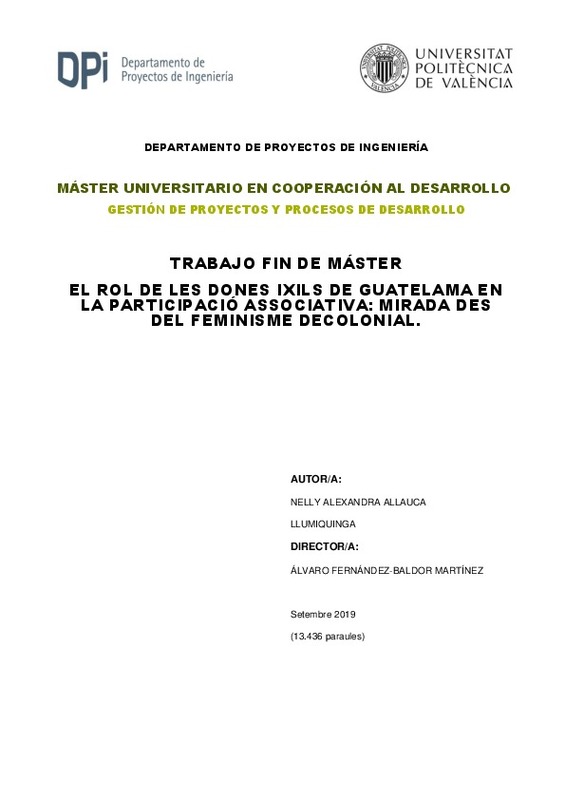|
Resumen:
|
[CA] El següent treball de fi de màster sorgeix des d’una inquietud personal i d’una demanda per part d’algunes dones de l’organització (Centro Kulbaalib Xe’clulub (CEKUXE) de Guatemala) per conèixer l’origen de les ...[+]
[CA] El següent treball de fi de màster sorgeix des d’una inquietud personal i d’una demanda per part d’algunes dones de l’organització (Centro Kulbaalib Xe’clulub (CEKUXE) de Guatemala) per conèixer l’origen de les desigualtats que pateixen dins i fora de l’organització. Arran d’aquesta qüestió, el treball es desenvolupa des d’una mirada decolonial i qüestionant l’imaginari que té la societat ixil sobre la participació de les dones a l’interior d’una associació, amb la finalitat de demostrar les desigualtats de gènere i les relacions de poder que afecten a les dones. En aquest context s’intenta vincular al procés històric des de la colonització fins el predomini neoliberal actual, per explicar les formes de participació de les dones guatemalenques ixils, des de l’enfocament de dues teories: El feminisme i la decolonialitat. La metodologia emprada parteix des del paradigma qualitatiu per l’anàlisi empíric de realitats socials, amb un mètode hermenèutic, i des d’una mirada decolonial. Per explicar-ho, l’anàlisi s’estructura en 4 parts:
En primer lloc, s'analitza la forma d’opressió sexualitzada i de gènere enllaçada en la societat ixil des de la colonització fins a hui en dia i com aquesta afecta directament a la cultura i els costums en l’àrea ixil.
En segon lloc, s’identifiquen els diferents factors de desigualtats i relacions de poder que pateixen i han patit les dones des de l’època colonial fins a la societat neoliberal actual, la qual forma part del sistema mundial diferenciat per una jerarquia racialitzada i un sistema de creences profundament arrelat en l’inconscient col·lectiu.
I en tercer lloc, s’analitzen les formes de participació de les dones de l'àrea ixil des de una mirada decolonial, partint d'un col·lectiu, socialment considerat, subaltern com són les dones i més concretament el rol que aquestes desenvolupen dins de la participació associativa.
Per finalitzar, s’elaboren unes recomanacions generals pel que fa al rol de les dones dins de les organitzacions en l'àrea ixil.
[-]
[EN] This master’s thesis arises from a personal inquisitiveness and from some women of the association Centro Kulbaalib Xe’clulub (CEKUXE) de Guatemala, in order to know the origin of inequalities that are suffered within ...[+]
[EN] This master’s thesis arises from a personal inquisitiveness and from some women of the association Centro Kulbaalib Xe’clulub (CEKUXE) de Guatemala, in order to know the origin of inequalities that are suffered within and out of the mentioned organization. Hereafter, the thesis is based on a decolonial perspective and it questions the Ixil society’s imaginary about women participation inside an association, with the purpose of proving the gender gap and the power relationships that concern women. In this context, there is an attempt of linking the historical process since colonization with the current neoliberal predominance, so that the ways of participation of Ixil Guatemalan women can be explained from two different approaches: feminism and decoloniality. The starting point of the applied methodology is a qualitative paradigm followed by an empiric analysis of social realities, with a hermeneutic method and from a decolonial perspective. This way, the analysis is structured in four parts: First of all, it is analyzed the sort of sexualized and gender oppression, related to the Ixil society, since the colonization until today and how it directly affects the culture and traditions in the Ixil region. Secondly, it is proceeded to identify the different factors of inequalities and power relationships that women have suffered in the colonial period and that still suffer in nowadays neoliberal society, which is part of the worldwide system, which in turn is differentiated by a racialized hierarchy and a system of beliefs deeply rooted to the collective unconsciousness. Thirdly, the different ways of Ixil women participation are analyzed in a decolonial point of view, from a socially considered subaltern collective, such as women are and more specifically, the role that they develop within an associative participation. Lastly, some general recommendations are suggested regarding the role of women in Ixil organizations.
[-]
|







